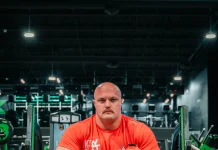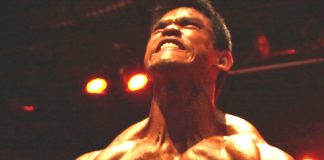Last Updated on January 14, 2024
Bodybuilding is a world filled with advice, some golden, some downright misleading. In this article, we’ll unravel the truths and debunk bodybuilding myths, ensuring you sculpt your physique with accurate knowledge.
The Myth of Spot Reduction
Spot reduction, the belief that you can melt fat from specific body parts through targeted exercises, is a persistent myth. We delve into why it doesn’t hold water and offer practical alternatives.
Understanding Fat Loss Mechanisms
To debunk spot reduction, understanding how our bodies burn fat is essential. We explore the science behind fat loss and how embracing a holistic approach yields better results.
Carbs are the Enemy
Carbs have been unjustly vilified in the fitness world. We debunk the myth that all carbs are detrimental, emphasizing the importance of smart carbohydrate choices.
The Role of Carbohydrates in Muscle Building
Carbs are not the enemy but a crucial ally in muscle building. Unpacking the science behind carbohydrates’ role in energy production and muscle growth, we reveal the truth about this misunderstood macronutrient.
Endless Cardio for Fat Loss
Many believe that the road to fat loss is paved with endless cardio sessions. We explore why this myth persists and introduce a more effective and sustainable approach.
High-Intensity Interval Training (HIIT) for Efficient Fat Burning
HIIT has gained popularity for a reason. We break down why it surpasses traditional cardio and how incorporating it into your routine can maximize fat loss.
More Protein Equals More Muscles
The myth that excessive protein intake equals massive muscles is widespread. We demystify this belief and provide insights into the optimal protein intake for muscle growth.
Protein Timing and Quality Matter
It’s not just about the quantity but also the timing and quality of protein intake. We guide you through the nuances of protein consumption to ensure you’re maximizing muscle protein synthesis.
The Anabolic Window
The belief in a post-workout anabolic window for optimal muscle gains is a pervasive myth. We discuss the science behind nutrient timing and its real impact on muscle recovery.
Nutrient Timing Beyond the Gym
Understanding that nutrient timing extends beyond the gym is crucial. We shed light on how strategic nutrient intake throughout the day influences muscle growth and recovery.
Heavy Weights Bulk, Light Weights Tone
The notion that heavy weights bulk and light weights tone is oversimplified. We break down the intricacies of rep ranges and their impact on muscle size and definition.
Progressive Overload for Sustainable Gains
Introducing the concept of progressive overload, we highlight why it’s the key to sustainable gains. Whether your goal is bulking or toning, progressive overload is your ally.
No Pain, No Gain
While a bit of discomfort is expected, the “no pain, no gain” mantra can lead to overtraining and injuries. We discuss the importance of listening to your body for optimal results.
Signs of Overtraining and How to Avoid It
Recognizing signs of overtraining is crucial for long-term success. We provide insights into avoiding overtraining and achieving a balanced and effective workout routine.
Supplements Replace a Balanced Diet
The supplement industry often perpetuates the myth that supplements can replace a well-rounded diet. We explore the role of supplements and why they should complement, not replace, whole foods.
Whole Foods vs. Supplements
Delving into the nutritional value of whole foods versus supplements, we guide you on striking the right balance for a sustainable and effective diet.
Bodybuilders Must Follow a Strict Diet
The belief that bodybuilders must adhere to an excessively strict diet is debunked. We emphasize the importance of flexibility and sustainability in nutrition.
Flexible Dieting for Long-Term Success
Introducing the concept of flexible dieting, we discuss how it allows for variety while still meeting your nutritional goals. No need to sacrifice your favorite foods!
Bodybuilding is Only for the Young
Age should never be a barrier to pursuing fitness goals. We break down the myth that bodybuilding is only for the young and share inspiring stories of individuals achieving greatness at any age.
Age-Appropriate Training and Goal Setting
Tailoring your training and goals to your age is key for sustained success. We offer practical tips for individuals of all ages to embark on a fulfilling bodybuilding journey.
In the vast landscape of bodybuilding, myths can hinder progress. Armed with knowledge, you can now navigate through the noise and sculpt your body with precision and purpose.
How many hours do bodybuilders workout per day?
The amount of time bodybuilders spend working out can vary widely based on their training goals, individual preferences, and training programs. In general, however, bodybuilders often engage in weight training sessions that typically last between 60 and 90 minutes. This includes the time spent on various exercises targeting different muscle groups, as well as rest periods between sets.
Additionally, many bodybuilders incorporate cardiovascular exercise and flexibility training into their routines. Cardiovascular sessions may last anywhere from 20 to 60 minutes, depending on the intensity and type of activity. Flexibility training or mobility work may add another 10 to 30 minutes to the overall workout.
It’s important to note that the total time spent in the gym doesn’t necessarily reflect the effectiveness of a workout. Quality and intensity of training, along with proper nutrition and recovery, are crucial factors for achieving fitness and bodybuilding goals. Moreover, individual preferences, lifestyle, and the specific goals of the individual can influence the duration and structure of their workout sessions.
Frequently Asked Questions (FAQs)
- Q: Can I spot reduce fat in specific areas?
- A: Spot reduction is a myth; fat loss is a holistic process. Targeted exercises won’t magically melt fat from specific areas.
- Q: Is there an ideal time to consume protein for muscle growth?
- A: Protein timing matters, but the anabolic window is not as rigid as once believed. Distribute protein intake throughout the day for optimal results.
- Q: Can I build muscle without lifting heavy weights?
- A: Absolutely! Progressive overload, achieved through various rep ranges, is the key to sustainable muscle growth.
- Q: Do I need to follow a strict diet to be a bodybuilder?
- A: No, flexibility is crucial. Flexible dieting allows for variety while still meeting your nutritional goals.
- Q: Is bodybuilding only for the young?
- A: Not at all! Age should never be a barrier. Tailoring your training and goals to your age is essential for long-term success.















